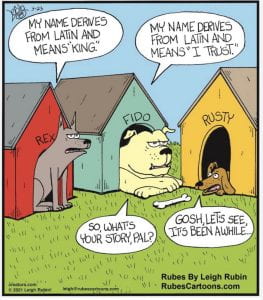“What’s in a name? That which we call a rose by any other name would smell just as sweet.”

 William Shakespeare uses this line in his play Romeo and Juliet to convey the idea that the naming of things is irrelevant. Now, who would I be to question Shakespeare. But, a name may be relevant in conveying something more important than the person or object? For example, we name our children after their grandparents for example. In my new novel, why did I chose the name Captain Ted Cooper for my submarine commander? Ted Cooper was a close neighbour and friend I knew in high school. We were both in a school play – King Lear as it happens. I remember being a guard in the play and Ted was backstage. After the last performance, to celebrate we sailed a twenty-four foot wooden boat into the night. We were blind like King Lear – unable to see in the dark – and eventually beached on an island to get some sleep. The boat leaked, but we happily explored and had a great time. Ted went on to serve in the merchant navy as a captain before passing away at a rather young age. Using his name seemed most appropriate for the submarine commander in my book. Any other name was (sorry, Shakespeare) not quite as sweet. Of course, I did check out the list of USA sub commanders, the most famous being Richard H. O’Kane of World War II fame. There was no “Cooper” among them and, therefore, unlikely to be any objection.
William Shakespeare uses this line in his play Romeo and Juliet to convey the idea that the naming of things is irrelevant. Now, who would I be to question Shakespeare. But, a name may be relevant in conveying something more important than the person or object? For example, we name our children after their grandparents for example. In my new novel, why did I chose the name Captain Ted Cooper for my submarine commander? Ted Cooper was a close neighbour and friend I knew in high school. We were both in a school play – King Lear as it happens. I remember being a guard in the play and Ted was backstage. After the last performance, to celebrate we sailed a twenty-four foot wooden boat into the night. We were blind like King Lear – unable to see in the dark – and eventually beached on an island to get some sleep. The boat leaked, but we happily explored and had a great time. Ted went on to serve in the merchant navy as a captain before passing away at a rather young age. Using his name seemed most appropriate for the submarine commander in my book. Any other name was (sorry, Shakespeare) not quite as sweet. Of course, I did check out the list of USA sub commanders, the most famous being Richard H. O’Kane of World War II fame. There was no “Cooper” among them and, therefore, unlikely to be any objection.

 What’s in a name? Everything. A few years ago a Chinese friend of mine rang to ask if New Zealand baby names had meanings. “Of course,” I said. He next asked, “What name means mistake?”
What’s in a name? Everything. A few years ago a Chinese friend of mine rang to ask if New Zealand baby names had meanings. “Of course,” I said. He next asked, “What name means mistake?” When doing school reports, I took care to keep the gender correct for each student. For example, Sue might get a generic comment that uses ‘he” and needs to be changed to ‘she’. It is more complicated in a novel and so easy to get wrong. Much easier to have the correct gender beforehand!
When doing school reports, I took care to keep the gender correct for each student. For example, Sue might get a generic comment that uses ‘he” and needs to be changed to ‘she’. It is more complicated in a novel and so easy to get wrong. Much easier to have the correct gender beforehand! What’s in a name – a character’s name, that is? In 3 WISE MEN the protagonist, Jak Daniels, was a very simple name to think up – a name, like the author’s, that causes confusion and mistaken identity. Jak meets a woman on the train – and her name is Sasha. In the early draft she had a different name – an older name, and one less fitted to her young looks and outgoing personality. ‘Sasha’ fitted her persona better and it was a name that worked well alongside ‘Jak’. But I wanted to mention another name used in 3 WISE MEN – Ambrose. His name was, in the first instance, ‘Ambroise’. One reader commented that he found it difficult to say ‘Ambroise’ correctly. Therefore, I reverted to the simpler spelling – ‘ Ambrose’. Again, this small revision made the text much easier to read. Finally, and one that I struggled with, was the name of Jak’s dog. I laugh thinking about it, because the first manuscript had a glaring error – I had given Jak’s dog three different names! Yes, names in a novel are important and need to provide – for a thriller at least- a measure of contrast and good (or bad) character-fit. The names of our 3 daughters also appear in the book, which was a nice touch to honor them. Another name – Andrea – was used (with permission) following a very special tour around Milan by someone of the same name. It took quite a while to come up with names that matched, but I do hope you find the names used in 3 WISE MEN appealing.
What’s in a name – a character’s name, that is? In 3 WISE MEN the protagonist, Jak Daniels, was a very simple name to think up – a name, like the author’s, that causes confusion and mistaken identity. Jak meets a woman on the train – and her name is Sasha. In the early draft she had a different name – an older name, and one less fitted to her young looks and outgoing personality. ‘Sasha’ fitted her persona better and it was a name that worked well alongside ‘Jak’. But I wanted to mention another name used in 3 WISE MEN – Ambrose. His name was, in the first instance, ‘Ambroise’. One reader commented that he found it difficult to say ‘Ambroise’ correctly. Therefore, I reverted to the simpler spelling – ‘ Ambrose’. Again, this small revision made the text much easier to read. Finally, and one that I struggled with, was the name of Jak’s dog. I laugh thinking about it, because the first manuscript had a glaring error – I had given Jak’s dog three different names! Yes, names in a novel are important and need to provide – for a thriller at least- a measure of contrast and good (or bad) character-fit. The names of our 3 daughters also appear in the book, which was a nice touch to honor them. Another name – Andrea – was used (with permission) following a very special tour around Milan by someone of the same name. It took quite a while to come up with names that matched, but I do hope you find the names used in 3 WISE MEN appealing.